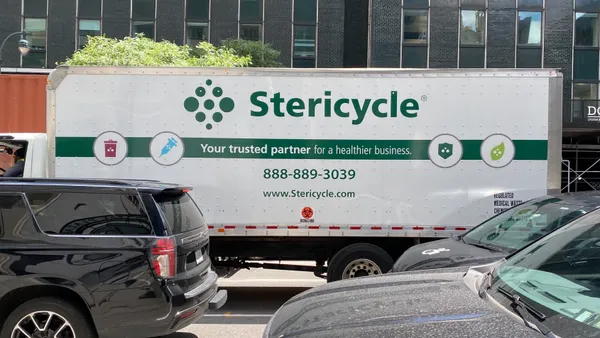UPDATE: June 28, 2019: A Ramsey County judge has stayed his previous order to suspend St. Paul, Minnesota's coordinated collection system, as reported by the Star Tribune. The program will now "continue as normal pending the city's appeal to the Minnesota Supreme Court," according to a city press release.
In his order staying the suspension, Judge Leonardo Castro acknowledged the city's contention that a June 30 deadline wouldn't allow property owners enough time to secure new collection arrangements. However, he denied the city's request to stay a November 5 referendum, which will remain on the docket if the city's appeal proves unsuccessful.
Dive Brief:
- St. Paul, Minnesota must suspend its coordinated collection system by June 30 until residents vote whether to revert to an open market structure. This development is per a May 30 ruling in Ramsey County District Court and is likely to take shape on a November ballot.
- This would supersede the city's contract with St. Paul Haulers, LLC — a consortium that currently includes Waste Management, Republic Services, Advanced Disposal Services and four other regional companies — and leave residents to once again select their own hauler until the system's future is resolved. While the city maintained this "would create unnecessary uncertainty and chaos," Judge Leonardo Castro wasn't swayed.
- As reported by Minnesota Public Radio and the St. Paul Pioneer Press, St. Paul Mayor Melvin Carter is expected to appeal the decision and promised collection service would not be interrupted for the estimated 70,000 households — even if it comes at the city's expense.
Dive Insight:
According to Castro's ruling, ordering the referendum does "not by itself eliminate the process for organized collection, it simply ensures that the public indeed supports the idea of organized collection with the mechanism of a public vote." At the same time, the judge's order does not provide a mechanism for collections after the June 30 deadline. Castro said he set that date to give residents time to arrange for their own collection service.
Having approximately 70,000 households switch back to the previous system may not prove so simple. Since St. Paul signed its contract with the consortium in Nov. 2017, the group's ranks have shrunk from 15 companies to seven, following ongoing consolidation. Service has also been adjusted to meet the demands of the new system that took effect Oct. 2018.
Meanwhile, St. Paul's back-and-forth can serve as a procedural cautionary tale for cities or other jurisdictions looking to change how their waste is collected through legislation. This latest ruling stems from a city council decision last year to disregard a ballot petition from residents. At the time, the city argued holding a referendum on the underlying collection ordinance would be illegal, as it could end with the city having to renege on a contract with the consortium.
The judge did not agree with that interpretation, ultimately ruling that citizens' right to vote on local "home rule" decisions outweighed any potential confusion or disruption that could come from reversing the decision. Until the city sees results from a potential appeal — or the system's long-term fate is decided in November — St. Paul may be in for a hectic period when it comes to managing collections.









